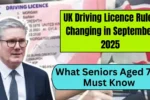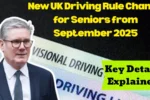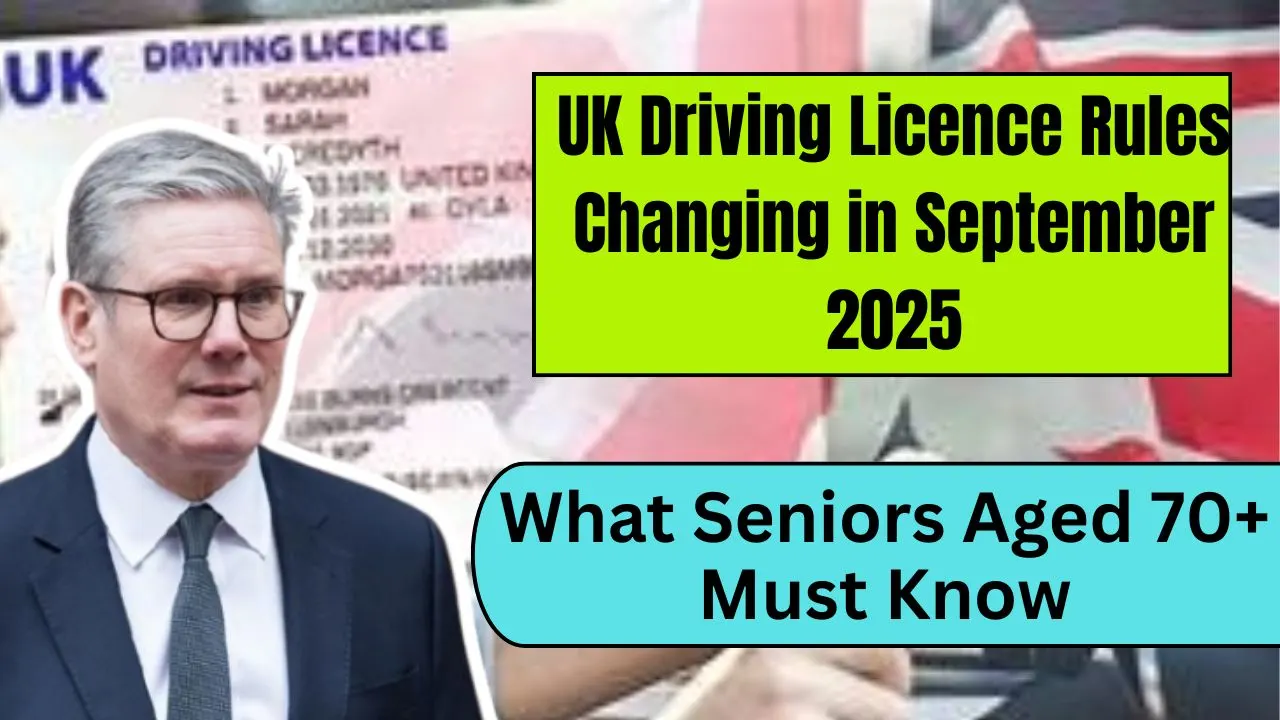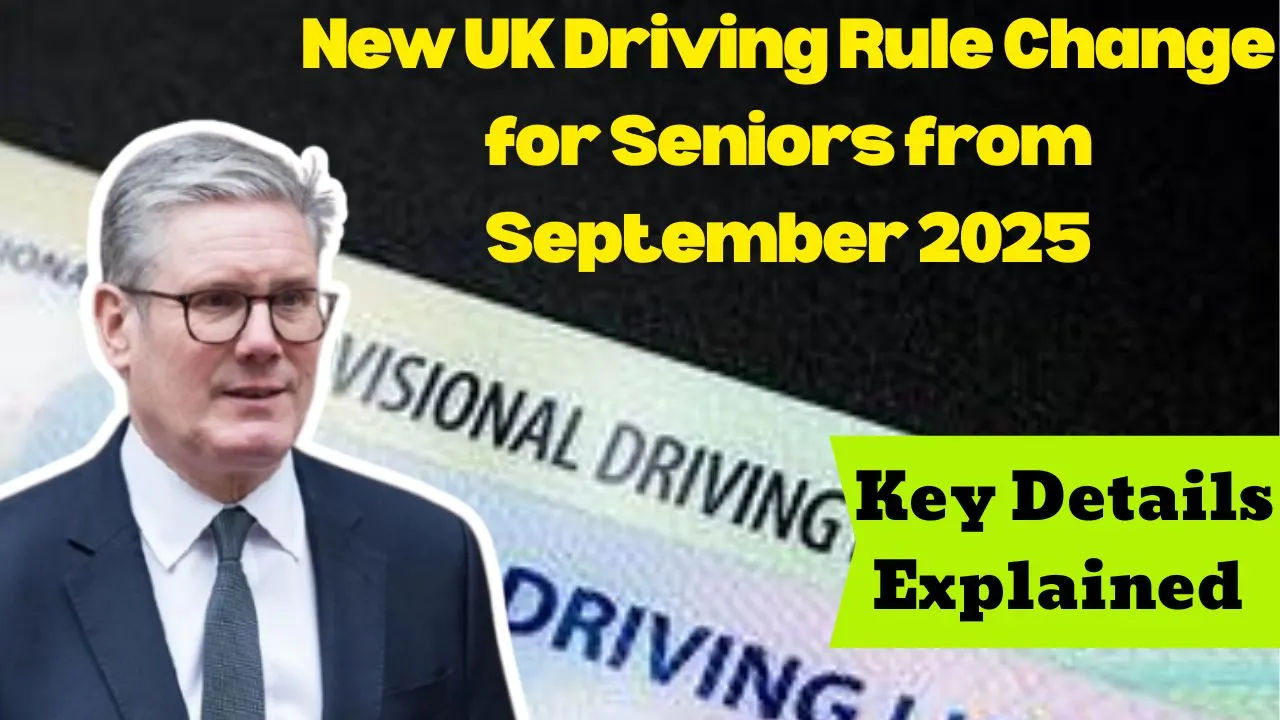The New UK Driving Licence Rules are officially rolling out from 10 September 2025, and if you’re 62 or older, these updates directly impact how you drive and renew your licence. For many seniors, driving is more than just a means of getting from point A to B – it’s freedom, independence and connection. That’s why it’s crucial to stay informed about what’s changing, how it affects you and what steps you need to take to keep your licence valid.
Whether you’re still driving daily or only use your car for occasional trips, the New UK Driving Licence Rules introduce significant changes around medical checks, renewal frequency, online applications and even your insurance premiums. In this guide, we’ll break everything down clearly so you know exactly what to expect and how to stay road-legal without the stress.
Understanding the New UK Driving Licence Rules
The New UK Driving Licence Rules for over 62s mark a major shift in how older drivers are regulated in the UK. Previously, most drivers didn’t need to renew their licences until age 70. But under the new guidance from the DVLA and Department for Transport, drivers aged 62 and over will now be required to renew earlier and more frequently.
This change is about more than just paperwork – it’s about ensuring that senior drivers remain safe, confident and medically fit behind the wheel. As part of the update, new health and vision checks are being introduced, and the government is encouraging drivers to use online renewal systems. While this might seem daunting for some, support will be available, and the process is designed to be easier and faster than before.
Overview of Key Changes
| Change Area | Details |
| Renewal Age | Begins at age 62 instead of 70 |
| Health Checks | Mandatory medical and eyesight assessments required |
| Licence Renewal Frequency | More frequent renewals post-62 |
| Application Method | Online renewals strongly encouraged by DVLA |
| Costs and Fees | Standard fees stay low, but medical documents may add extra cost |
| Insurance Impacts | Premiums may change based on age and medical clearance |
| Support for Seniors | Extra help from DVLA, councils and community centres for vulnerable drivers |
Medical checks for older drivers
A key part of the New UK Driving Licence Rules is the introduction of required medical assessments starting at age 62. These checks are not intended to catch anyone out – instead, they’re about giving drivers and their families confidence that health issues will not interfere with safe driving.
You can expect a routine eyesight test and potentially a general health review. If you have conditions such as diabetes, high blood pressure or heart disease, you might be asked to provide additional documentation from your GP. For most healthy drivers, the process should be straightforward. But it’s smart to schedule regular eye tests and keep your GP informed about your health well in advance of renewal time.
Impact on driving licence fees
One concern raised by older drivers is whether these changes mean higher costs. Under the New UK Driving Licence Rules, standard renewal fees are expected to remain affordable. However, any required health checks, GP letters or vision assessments could result in added costs.
If you are living on a pension or fixed income, it’s wise to budget for these expenses ahead of time. The government has stated that it may explore discounted fees or support options for low-income seniors. Still, being financially prepared for the renewal process will help avoid any last-minute surprises.
Online renewal process
Another major update is the shift towards digital renewals. The DVLA is encouraging over 62s to use their online portal to update their driving licence. This system is intended to be faster and more reliable than the old paper process, cutting down on waiting times and lost applications.
That said, not everyone is comfortable using computers or smartphones. To help with this, the DVLA plans to offer clear instructions, helplines and possibly maintain some services through post offices. If you’re unsure how to renew online, ask a family member to assist or reach out to a local support service that can walk you through the steps.
Effects on insurance policies
Insurance companies are paying close attention to the New UK Driving Licence Rules, and changes could influence how much you pay for cover. The requirement for regular medical and vision checks might be seen as a positive by some insurers, who could offer discounts to drivers who are medically cleared.
On the flip side, some providers may still consider age as a key factor in risk assessment, which could result in higher premiums regardless of your health. It’s worth shopping around and comparing policies before your renewal date. Look for providers who offer flexibility and better deals for older, safe drivers.
Why the rules are changing
So, why has the government made these changes now? Simply put, it’s about safety. As more people continue to drive well into their 70s and 80s, officials want to strike a balance between keeping roads safe and supporting older drivers’ independence.
Research shows that drivers in their early 60s tend to have good safety records. But as age progresses, so does the likelihood of slower reaction times or health-related impairments. By moving the renewal process earlier, potential issues can be spotted and addressed before they become dangerous.
Concerns among senior drivers
It’s completely natural to feel uneasy about new rules that may add extra steps or uncertainty. Some older drivers fear that these updates might limit their freedom or be based solely on age rather than ability.
Advocacy groups have already raised concerns about how the rules might affect those living in rural areas or people with limited access to healthcare or digital tools. In response, the government has promised to work closely with senior support groups to ensure the system is fair and doesn’t unfairly penalise older people.
Preparing for the September 2025 changes
If your 62nd birthday is coming up before or around 10 September 2025, now is the time to prepare. First, check your licence’s expiry date. Next, make an appointment for a vision test and a routine health check with your GP.
Familiarise yourself with the DVLA’s online renewal system so you know what to expect. If you’re unsure, ask a family member to show you how it works. Taking small steps now will make the renewal process much easier when the time comes.
Support for vulnerable pensioners
The government acknowledges that not everyone will find these changes easy to manage. That’s why additional support will be offered to those who may need help, including seniors with disabilities, limited digital skills or financial challenges.
Local councils, community centres and charities are expected to play a role in providing practical guidance and hands-on support. If you think you might need help when the rules take effect, don’t hesitate to reach out to these resources well in advance.
Final thoughts on the new rules
The New UK Driving Licence Rules might feel like a big adjustment, but they’re not designed to make life harder for older drivers. In fact, with a bit of preparation and the right support, they can make driving in later life safer, more manageable and more secure.
If you’re approaching 62, take the time now to prepare. Stay informed, stay healthy and stay safe on the roads. And if you know someone who might be affected by these changes, share this guide with them – it could save them time, stress and confusion.
FAQs
Do I have to stop driving when I turn 62?
No, you don’t. But under the new rules, you’ll need to renew your licence and may have to undergo medical checks to confirm you’re fit to drive.
How often will I need to renew my licence after 62?
Renewals will likely be required every three years, similar to the current rules for over-70s, but starting earlier.
Can I still renew my licence at the post office?
While the DVLA encourages online renewals, some in-person services at post offices may still be available, especially for those who need assistance.
Will my insurance go up just because I’m over 62?
Not necessarily. Some insurers may offer better rates if you pass health and eyesight tests, while others may increase premiums due to age alone.
What if I don’t have access to the internet?
Support is being planned through local centres and charities to help seniors with limited internet access complete renewals.












